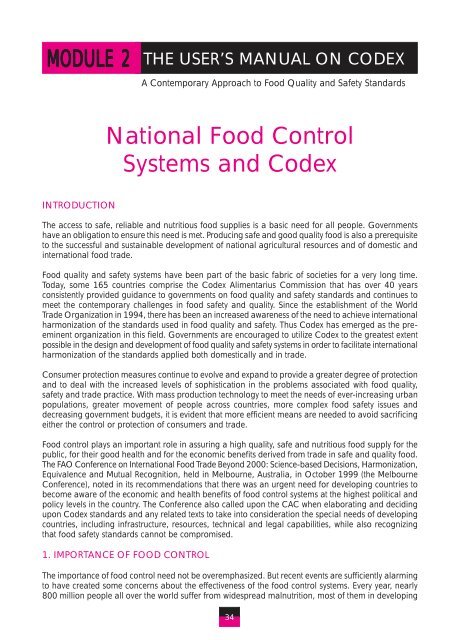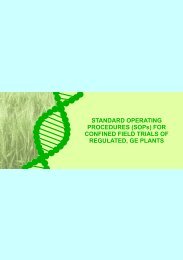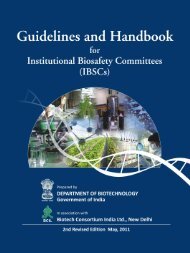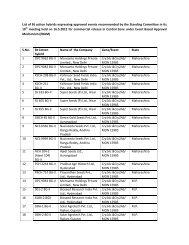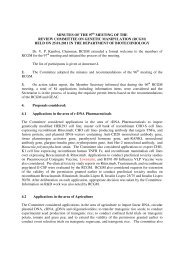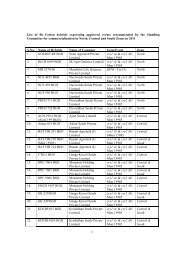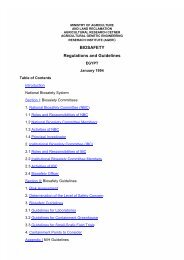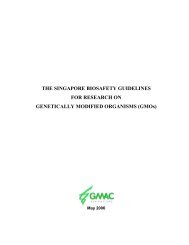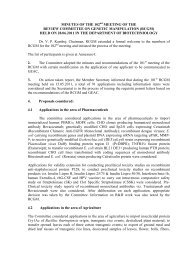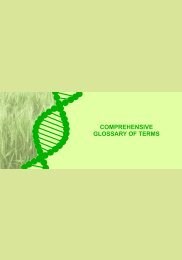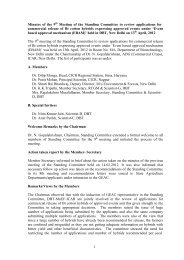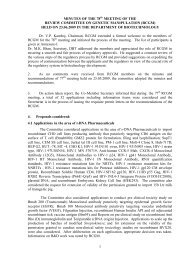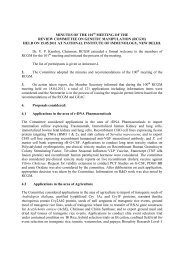THE USER'S MANUAL ON CODEX - Department of Biotechnology
THE USER'S MANUAL ON CODEX - Department of Biotechnology
THE USER'S MANUAL ON CODEX - Department of Biotechnology
Create successful ePaper yourself
Turn your PDF publications into a flip-book with our unique Google optimized e-Paper software.
MODULE 2<br />
<strong>THE</strong> USER’S <strong>MANUAL</strong> <strong>ON</strong> <strong>CODEX</strong><br />
A Contemporary Approach to Food Quality and Safety Standards<br />
National Food Control<br />
Systems and Codex<br />
INTRODUCTI<strong>ON</strong><br />
The access to safe, reliable and nutritious food supplies is a basic need for all people. Governments<br />
have an obligation to ensure this need is met. Producing safe and good quality food is also a prerequisite<br />
to the successful and sustainable development <strong>of</strong> national agricultural resources and <strong>of</strong> domestic and<br />
international food trade.<br />
Food quality and safety systems have been part <strong>of</strong> the basic fabric <strong>of</strong> societies for a very long time.<br />
Today, some 165 countries comprise the Codex Alimentarius Commission that has over 40 years<br />
consistently provided guidance to governments on food quality and safety standards and continues to<br />
meet the contemporary challenges in food safety and quality. Since the establishment <strong>of</strong> the World<br />
Trade Organization in 1994, there has been an increased awareness <strong>of</strong> the need to achieve international<br />
harmonization <strong>of</strong> the standards used in food quality and safety. Thus Codex has emerged as the preeminent<br />
organization in this field. Governments are encouraged to utilize Codex to the greatest extent<br />
possible in the design and development <strong>of</strong> food quality and safety systems in order to facilitate international<br />
harmonization <strong>of</strong> the standards applied both domestically and in trade.<br />
Consumer protection measures continue to evolve and expand to provide a greater degree <strong>of</strong> protection<br />
and to deal with the increased levels <strong>of</strong> sophistication in the problems associated with food quality,<br />
safety and trade practice. With mass production technology to meet the needs <strong>of</strong> ever-increasing urban<br />
populations, greater movement <strong>of</strong> people across countries, more complex food safety issues and<br />
decreasing government budgets, it is evident that more efficient means are needed to avoid sacrificing<br />
either the control or protection <strong>of</strong> consumers and trade.<br />
Food control plays an important role in assuring a high quality, safe and nutritious food supply for the<br />
public, for their good health and for the economic benefits derived from trade in safe and quality food.<br />
The FAO Conference on International Food Trade Beyond 2000: Science-based Decisions, Harmonization,<br />
Equivalence and Mutual Recognition, held in Melbourne, Australia, in October 1999 (the Melbourne<br />
Conference), noted in its recommendations that there was an urgent need for developing countries to<br />
become aware <strong>of</strong> the economic and health benefits <strong>of</strong> food control systems at the highest political and<br />
policy levels in the country. The Conference also called upon the CAC when elaborating and deciding<br />
upon Codex standards and any related texts to take into consideration the special needs <strong>of</strong> developing<br />
countries, including infrastructure, resources, technical and legal capabilities, while also recognizing<br />
that food safety standards cannot be compromised.<br />
1. IMPORTANCE OF FOOD C<strong>ON</strong>TROL<br />
The importance <strong>of</strong> food control need not be overemphasized. But recent events are sufficiently alarming<br />
to have created some concerns about the effectiveness <strong>of</strong> the food control systems. Every year, nearly<br />
800 million people all over the world suffer from widespread malnutrition, most <strong>of</strong> them in developing<br />
34


